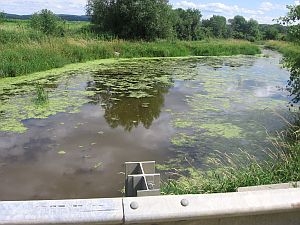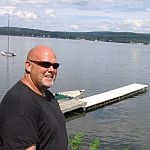
(Host) Earlier this summer, the state Health Department warned swimmers to stay out of parts of Lake Champlain. The state said toxic algae blooms were a danger for swimmers.
The blooms have since been broken up by strong winds. But water quality remains a concern. And persistent water pollution may be affecting property values. Those who sell lakeshore real estate say the price goes down when you can’t swim in the water.
VPR’s John Dillon reports:
(Dillon) In his office at Coldwell Banker Islands Realty in South Hero, Evan Potvin flips through a binder full of lakeshore listings.
(Potvin) "Those are two camps down in South Hero, listed for $550,000. The water quality is kind of hit or miss right now. It’s probably a little weedy because of all the rain."
 (Dillon) Potvin grew up in the islands – his grandmother Jane Potvin served four terms in the Legislature. And he’s seen the water quality get worse over the years. When he was a kid, he says, algae growth was never a problem. Now the toxic blooms are a regular summertime occurrence on the lake’s northern bays. At the same time, water milfoil and aquatic weeds choke off other areas of the lake.
(Dillon) Potvin grew up in the islands – his grandmother Jane Potvin served four terms in the Legislature. And he’s seen the water quality get worse over the years. When he was a kid, he says, algae growth was never a problem. Now the toxic blooms are a regular summertime occurrence on the lake’s northern bays. At the same time, water milfoil and aquatic weeds choke off other areas of the lake.
The blue green algae blooms look like a layer of paint coating the water. The millions of tiny organisms produce a poison and when they die, the toxin is released into the lake, posing a threat to people and pets. Water weeds aren’t dangerous. But nobody likes to swim through a tangle of aquatic plants.
The algae and weeds are fed by nutrient pollution – primarily phosphorus – that flows off the land. Potvin says clean water is a top priority for potential property buyers.
(Potvin) "When we list a lakefront property, that’s one of the main questions because it does have a significant impact on the value. When people are looking, buyers want water they can swim in and use. You don’t want to pay for something you can’t use, because it’s not cheap."
(Dillon) Potvin says you can see the impact on property values by comparing prices for camps where the water is clean – such as those on the west side of South Hero – with property on Missisquoi Bay or on the east side of Alburgh where algae can be a problem.
(Potvin) "Value-wise, in South Hero on the west shore, you’re looking at $500,000 or above, even for a camp, like a three-season cottage. On the Alburgh Passage, you’re looking at something like $200,000 for the same camp. So it’s a big difference."
(Dillon) Part of that difference, he says, has to do with the distance from Burlington. South Hero is closer and the property there is usually worth more. But water pollution affects prices as well.
(Potvin) "The cleaner the water the nicer the value is on the land. Whether or not it’s got a decent house on it – that can be changed – whereas the lake value is not something you can control."
(Dillon) Go north up to St. Albans Bay, and you’ll find some residents worried that poor water quality has depressed their property values.
(Hill) "The potential environmental impact of phosphorus pollution primarily from agriculture sources is a significant concern to me as a property owner here in St. Albans."
(car rumble)
 (Dillon) Dennis Hill owns a house on the bay. As we drive around the lakeshore road, Hill points out what he says are major pollution sources.
(Dillon) Dennis Hill owns a house on the bay. As we drive around the lakeshore road, Hill points out what he says are major pollution sources.
(Hill) "Directly underneath us … there’s a pipe that runs – it’s about a two-foot culvert – and it drains this barn yard. The water comes off the roof, there’s no gutter or rain catch of any sort. It runs right through this grassy field that’s only about 30 feet wide, and directly into the lake. You can even smell it as we go by."
(Dillon) Hill is upset by what he sees as lax enforcement by the state on agriculture pollution.
A field with towering corn stalks draws his attention. Ditches run through the field, potentially draining liquid manure and fertilizer to the lake. But Hill says the state doesn’t require buffer strips along the ditch to protect water quality. To make his point, he cruises by a small stream called Black Creek.
(Hill) "And Black Creek feeds the bay and as you can see you have these mega farms that farm this land all along the creek. And so they’re required to buffer on that side, on the river side. And most of them do. But then you can see on this side, there’s no buffer on this ditch, which feeds ultimately the creek, which feeds ultimately the lake."
(Dillon) Julie Moore directs the state’s Lake Champlain clean-up efforts. A main focus is agricultural run-off, and Moore agrees that the state and the federal government have inconsistent definitions of waterways that require buffer zones.
(Moore) "We all have theme and variation on the definition of a stream. So I think that makes it really challenging for farmers to actually go out and assess what is a stream and what isn’t."
(Dillon) But Moore says most corn land falls under regulations that do require buffer areas for ditches. She says she’s familiar with the problems that Dennis Hill pointed out on his drive along St. Albans Bay. And she says there is money available to help farmers reduce pollution.
Moore was at farmer Roger Rainville’s place in Alburgh this month checking out projects that could improve water quality.
Rainville chairs the Farmers Watershed Alliance, a group dedicated to improving water quality in the Champlain basin. The group launched a project this spring that uses specialized equipment to aerate and slice the soil so fertilizer and manure stay in the ground and don’t run off the fields.
Rainville says farmers own plenty of lakeshore land, so he says they have a strong interest in protecting property values.
(Rainville) "Farmers are willing to participate in anything we put out there, anything. They know that. Sometimes a lot of these farms we go on and we do an assessment on these farms with the Watershed Alliance and they don’t realize there’s an issue…. And it’s more of pointing out that this could be a potential problem, and are you willing to address it? We’ve never had anybody say no. Never."
(Dillon) Farms are part of the Vermont beauty that real estate buyers treasure. And so is clean water.
Chris Von Trapp is a real estate agent in Burlington who specializes in lakeshore property. He’s seen potential sales killed when customers take a look at the algae blooms on the water.
(Von Trapp) "I’ve been in a few situations, not a lot, but where the timing is just right, and you show up at the property and it looks as if you could walk off the shoreline on to the water. And those showings tend to be very, very quick and brief."
(Dillon) Von Trapp says the economy is depressing real estate values more than water quality. But he says pollution has had an impact.
(Von Trapp) "It clearly seems that the political will is there, the desire is there, and certainly the acknowledgement of the problem is there. But in reality it’s hard to measure any of the programs that have been put in place as having any positive effect. So in the long term I’m really concerned about the future of anyone enjoying Lake Champlain, whether it’s a landowner that fronts the water or the boating public."
(Dillon) Von Trapp says Lake Champlain is an economic engine for Vermont, and deserves greater protection.
For VPR News, I’m John Dillon.